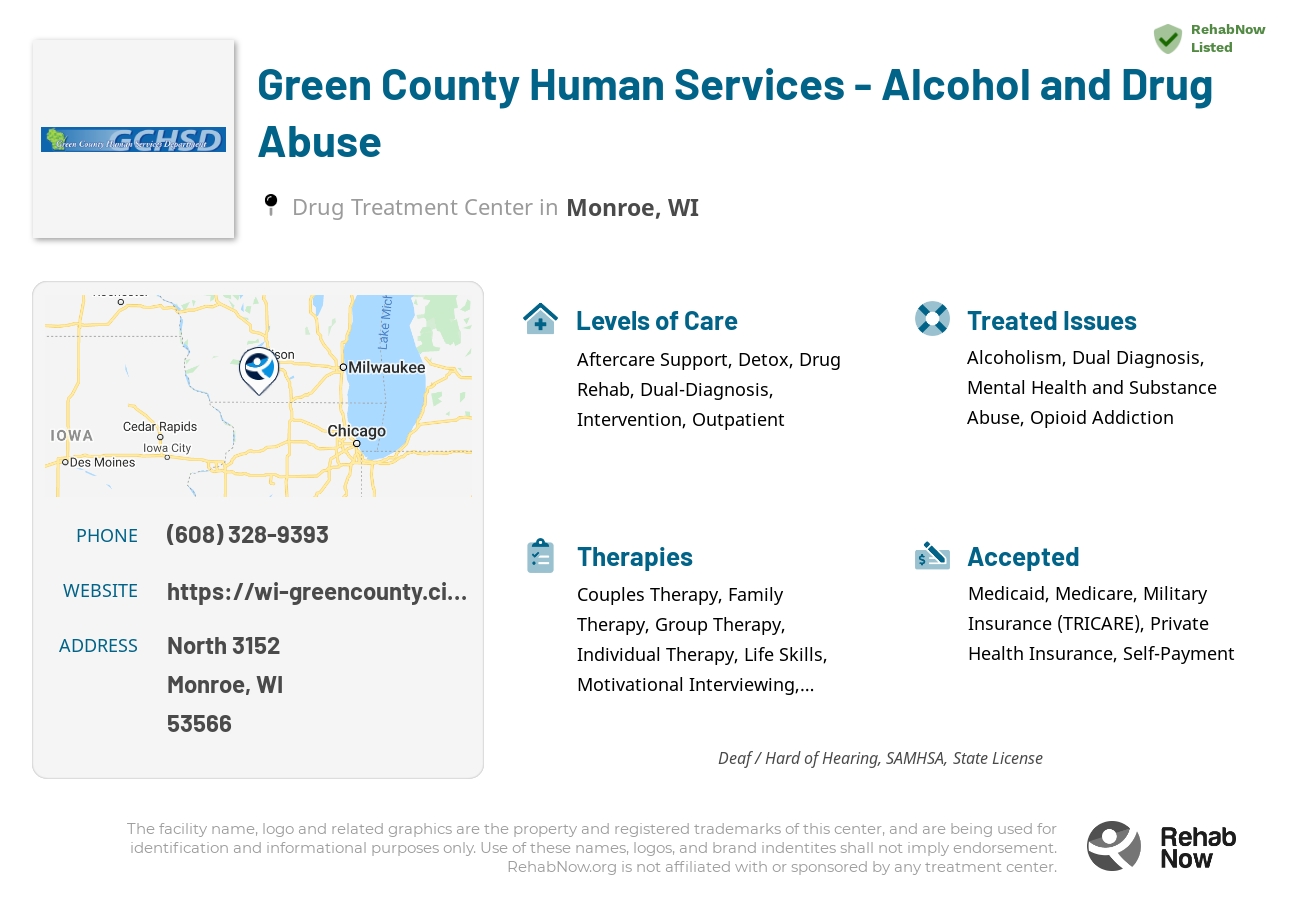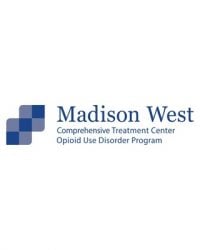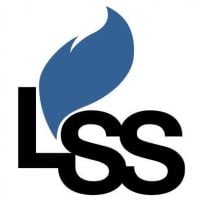Green County Human Services - Alcohol and Drug Abuse
Drug Rehab Center in Monroe, Wisconsin
Green County Human Services - Alcohol and Drug Abuse in Monroe, WI offers evidence-based and comprehensive addiction treatment programs, including detox, rehab, and aftercare support, with a focus on individualized care and lasting recovery.
About Green County Human Services - Alcohol and Drug Abuse in Wisconsin
Green County Human Services - Alcohol and Drug Abuse, a public rehab facility located in Monroe, Wisconsin, specializes in treating alcoholism, drug addiction, dual diagnosis, mental health, substance abuse, and opioid addiction. With a history of providing comprehensive care, the center is dedicated to helping individuals in the community overcome their struggles with addiction and achieve lasting recovery.
• Accredited by SAMHSA and state-licensed, ensuring high-quality care
• Accepts private health insurance, making treatment more accessible
• Offers a wide range of evidence-based treatments and services
• Provides individualized care with a focus on relapse prevention
The facility's accreditations from SAMHSA and the state of Wisconsin demonstrate their commitment to providing top-notch care. By accepting private health insurance, Green County Human Services - Alcohol and Drug Abuse makes treatment more accessible to those in need.
In addition to treating alcohol and drug addiction, the center also addresses dual diagnosis, mental health issues, and opioid addiction. Their comprehensive approach includes aftercare support, detox programs, drug rehab, and dual-diagnosis interventions.
The professional team at Green County Human Services - Alcohol and Drug Abuse employs a variety of evidence-based methods, such as couples and family therapy, group activities, cognitive behavioral therapy, and trauma therapy. They also utilize motivational interviewing and rational emotive behavior therapy (REBT) to help clients develop the necessary life skills for maintaining a sober lifestyle.
Genders
Ages
Modality
Additional
Accreditations
State License
SAMHSA
Conditions and Issues Treated
Many people who struggle with opioid addiction need to attend specific programs like methadone , Suboxone or Vivitrol clinics.
These types of programs will provide the patient with legal, prescription medications that can help them overcome their cravings for illegal opioids like heroin or fentanyl . If the patient has a chronic condition like Hepatitis C, they must undergo treatment before they can begin taking these medications.
Dual Diagnosis is a specific relationship between two or more disorders that have the same symptoms and can sometimes be treated together. This is used in the treatment planning process when dealing with drug addicts. Dual diagnosis can be viewed as a chronic medical condition that has comorbid psychiatric disorders.
Although addiction and a mental illness may have separate symptoms that are not easy to detect, they often go hand in hand. Many times, drug abuse is a direct result of the mental illness. In other words, treating the addiction will not resolve all of your issues. Unless you also treat the underlying mental illness, you will not be successful in achieving sobriety.
Levels of Care Offered
This center offers a variety of custom treatment tailored to individual recovery. Currently available are Aftercare Support, Detox, Drug Rehab, Dual-Diagnosis, Intervention, Outpatient, with additional therapies available as listed below.
Detox refers to the progressive elimination from the body of toxins. The detox period depends on the form of addiction, the length of drug abuse, and the state of health. Under the supervision of medical practitioners, MAT detox based in Monroe, WI requires the use of medications.
An outpatient treatment program is set up to help with alcohol or drug addiction, or a co-occurring disorder. The patient must attend the Wisconsin facility for their therapy and other programs but are able to return home each night. The frequency of mandatory attendance decreases after much of Green County Human Services - Alcohol and Drug Abuse‘s program is complete.
Intervention services can be beneficial for people who have not been able to overcome drug and alcohol addiction on their own. It is recommended for individuals whose addiction has led to dangerous or life-threatening circumstances.
Intervention services are beneficial for:
- People who have relapsed after completing other forms of addiction treatment.
- People with drug addictions that have led to dangerous health conditions, such as HIV.
- People who are at risk of losing their family, home, or job due to addiction.
- People who are having difficulty overcoming drug and alcohol addiction on their own.
- An intervention can be conducted by professionals, or by loved ones of an addict. If the person being intervened on agrees to enter addiction treatment after the intervention, the next step would be to choose a treatment program.
If they do not agree to enter addiction treatment after the intervention, loved ones may choose to go back to the drawing board and try another form of treatment. They may also choose to not receive any further treatment, but there are usually other factors in play that may make it difficult for people to stop using drugs or alcohol.
Aftercare is a term that’s used to refer to any sort of continuing care offered for a drug addict who has voluntarily entered a rehabilitation program. This type of care can be provided in several settings, including outpatient therapy sessions after the addict has completed an inpatient program. There are also 12-step support groups, such as Alcoholics Anonymous, which can provide additional help for addicts trying to stay sober.
Therapies & Programs
Individual Therapy is a critical component of addiction recovery. Therapists work with patients to identify the root of their addiction and figure out how to better handle the issues that led to them using drugs. Individual Therapy is the one-on-one session where people meet with their therapist. Individual therapy provides a safe space for people to open up and discuss personal and sensitive topics which they may not feel comfortable discussing in a group setting.
Couples therapy at Green County Human Services - Alcohol and Drug Abuse focuses on addiction treatment for the addict and their spouse. The addict’s family, not just the addict, can benefit from this form of therapy. Couples therapy addresses communication problems, trust issues, lack of intimacy, and abuse in intimate relationships. Couples therapy can help rebuild trust between partners, which increases the chances for successful treatment and sustained recovery.
Intimate relationships can be damaged during addiction, and professional help may be necessary to rebuild the often destroyed trust and love. Couples therapy at Green County Human Services - Alcohol and Drug Abuse helps couples improve communication and rebuild trust. Either or both partners will be helped by this treatment administered by professionals. This treatment can also help one or both partners if addiction is the problem.
Family therapy will also help families realize that the addiction is not their fault. For many years, people blamed themselves for an addict’s behavior and felt that they had done something wrong. This is not the case. Addiction is a disease, and it can strike anyone, even if their life seems fine from the outside. It can bring a lot of shame to a family when they have an addict in their midst, but if everyone is open and honest with each other, then they can help everyone stay in recovery.
Group Therapy is utilized by drug treatment centers like Green County Human Services - Alcohol and Drug Abuse to provide the recovering drug addict with a platform to talk about their feelings and experiences. It also provides for an opportunity to learn from other addicts who have successfully overcome their addiction.
Group Therapy is employed in lectures, seminars, or discussion groups (the latter two are typically conducted as “therapy groups”). It is recommended that all group members be recovering addicts for this type of therapy to work (though it does not exclude others with lived experience).
Trauma therapy is a clinical process that helps individuals deal with mental stress often caused by traumatic events. It is generally done for children, teenage victims of sexual assault, and war veterans. The therapist helps the person identify, understand and work through the problem. This is done with the help of talking about it in group or one-on-one counseling sessions. Therapists use relaxation, role-playing, art, and music to help the person open up about what is bothering them.
Cognitive behavioral therapy is also a popular service for individuals living with addiction. This type of supportive treatment uses both one-on-one counseling and group sessions to teach addicts how to identify thoughts, behaviors and emotions that might increase their risk of relapse.
These professionals can help addicts develop coping skills for managing stress, improving self-esteem and overcoming triggers. They might also use behavioral therapy to help addicts learn how to avoid cravings and warning signs that could lead them back into addiction.
Therapy can be used as a step-down from inpatient treatment or as the primary method of overcoming an addiction. No matter which option is best for the addict, they will teach important emotional coping techniques, which can make it easier for addicts to get through the tough days.
(REBT) was developed by Dr. Albert Ellis in 1955. The therapy is based on the premise that our beliefs lead to and maintain our emotions and behaviors. Therefore, if a person has irrational thoughts, they will have an unhealthy emotional life. And as long as those irrational beliefs remain unchanged, they will continue to have unhealthy emotions and behaviors.
REBT is a purely psychological therapy, meaning it does not incorporate the use of medications or supplements. Instead, REBT focuses on helping people understand, respect, and accept their feelings without judgment, enabling them to have more control over their actions and behaviors.
The therapeutic process is straightforward: clients learn to identify the irrational beliefs that cause distress, challenge good coping statements, and replace them with healthy, rational beliefs.
Training in improved life skills helps those recovering from addiction feel more capable of self-care. Green County Human Services - Alcohol and Drug Abuse are daily skills that give the person the tools they need to survive.
The therapy covers practical activities like cooking, job hunting, social interaction, and money management, helping to fill in the knowledge gaps caused by addiction.
These life skills help the person self-manage their recovery and stay on track. It also reduces relapse risk as they gain confidence in their day-to-day abilities.
Payment Options Accepted
For specific insurance or payment methods please contact us.
Is your insurance accepted?
Ask an expert, call (888) 674-0062
Additional Details
Specifics, location, and helpful extra information.
Monroe, Wisconsin 53566 Phone Number(608) 328-9393 Meta DetailsUpdated April 15, 2024
Staff Verified
Green County Human Services - Alcohol and Drug Abuse Patient Reviews
There are no reviews yet. Be the first one to write one.
Monroe, Wisconsin Addiction Information
Wisconsin has some of the highest rates in the United States for both adolescent and adult substance abuse. Since 2009, the state has been experiencing the same escalating rates of drug abuse and addiction as the rest of the country. The major concerns are the misuse of prescription painkillers and the escalating number of deaths due to alcohol-related liver disease.
Monroe, Wisconsin is among the top 20% of U.S. counties with the highest rates of drug use. Addiction to prescription painkillers is a serious problem. The age range with most drug-related admissions is 25 to 44 (27.2% of female patients). Commonly abused drugs include alcohol, methamphetamine, cocaine, and heroin. It can be hard to know which treatment is the best for you. You can start by looking online or asking your doctor.
Treatment in Nearby Cities
- De Pere, WI (149.8 mi.)
- Platteville, WI (43.8 mi.)
- Washburn, WI (287.9 mi.)
- West Allis, WI (87.3 mi.)
- Eau Claire, WI (178.6 mi.)
Centers near Green County Human Services - Alcohol and Drug Abuse
The facility name, logo and brand are the property and registered trademarks of Green County Human Services - Alcohol and Drug Abuse, and are being used for identification and informational purposes only. Use of these names, logos and brands shall not imply endorsement. RehabNow.org is not affiliated with or sponsored by Green County Human Services - Alcohol and Drug Abuse.









